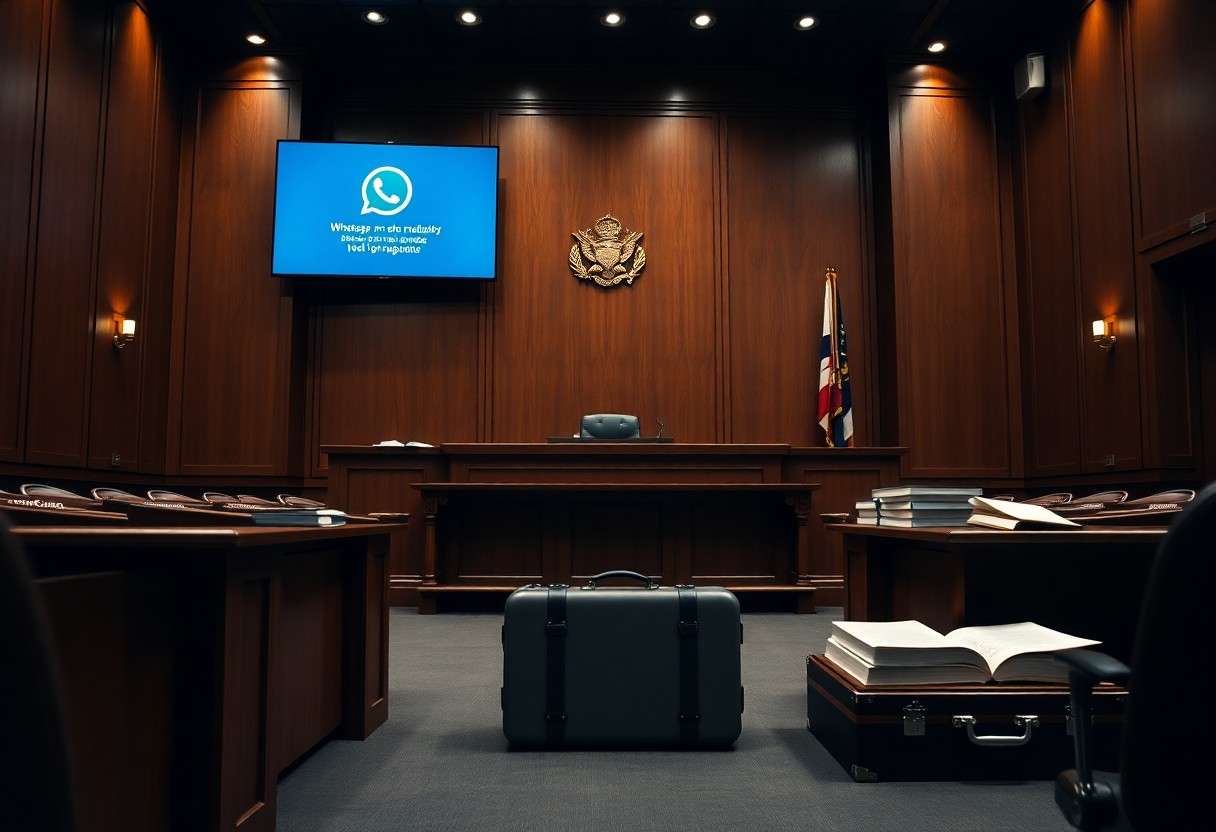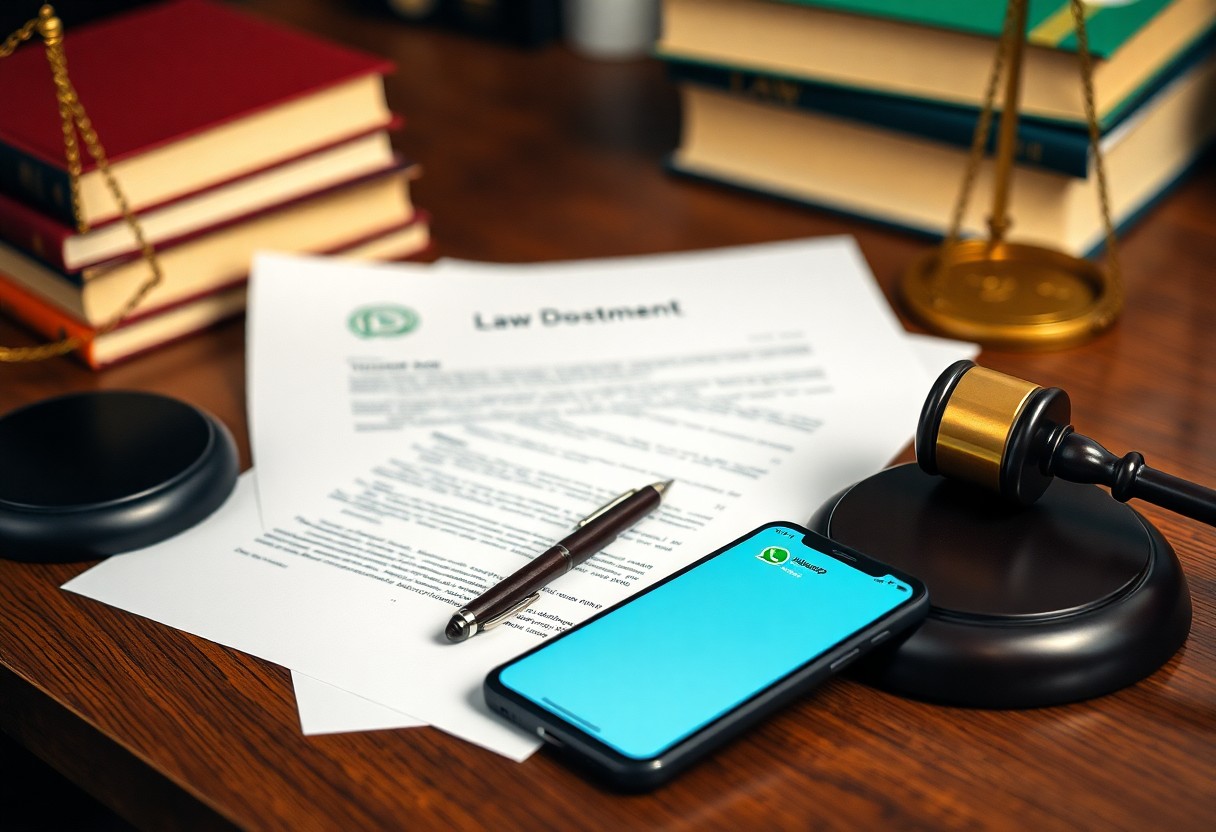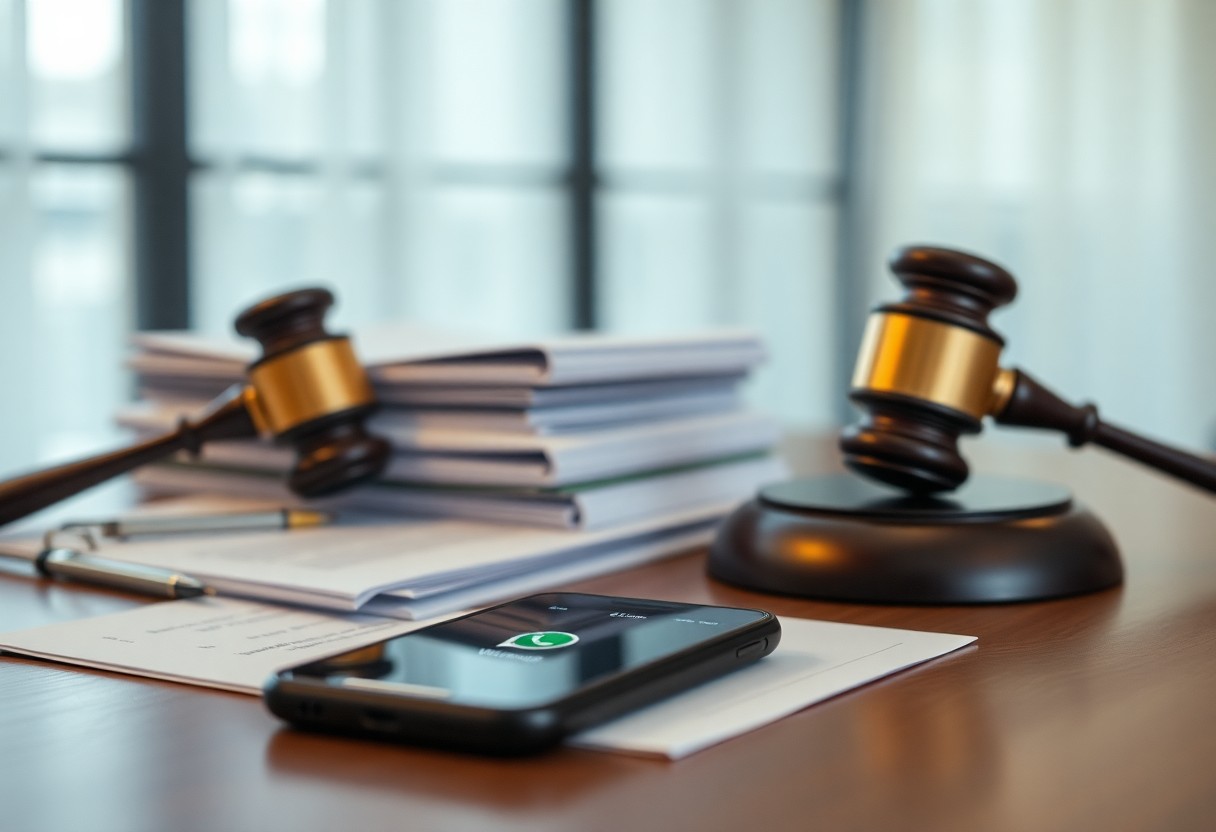Just as digital communication has transformed relationships, it has also made its way into legal proceedings. You may wonder if WhatsApp messages can serve as valid evidence in your divorce case in Malaysia. The good news is that these messages can indeed be used in court, provided they are authenticated properly and relevant to the divorce. Understanding how the court views this type of communication can significantly impact the outcome of your case, making it vital for you to know your rights and options.

Key Takeaways:
- WhatsApp messages can be admissible as evidence in Malaysian divorce proceedings.
- Messages must be relevant to the case, demonstrating issues such as infidelity or financial matters.
- Parties should ensure the authenticity of the messages presented in court.
- Evidence may require additional context or corroboration to be fully convincing.
- Privacy concerns may arise, necessitating careful handling of personal communications.
- Screen captures and backups can serve as valid forms of evidence if properly documented.
- Legal counsel should be sought to navigate the complexities of digital evidence in court.

Legal Framework Governing Digital Evidence in Malaysia
The Malaysian legal system recognizes digital evidence under specific frameworks that ensure its admissibility in court. Central to this is the Evidence Act 1950, which provides the guidelines for what constitutes acceptable evidence, including electronic communications like WhatsApp messages. Understanding these legal stipulations is vital for anyone considering the use of digital correspondence in divorce proceedings.
The Evidence Act 1950
The Evidence Act 1950 governs the admissibility of evidence in Malaysian courts, including digital formats. Electronic communications, such as WhatsApp messages, may be presented as evidence if they meet the criteria outlined in the Act, particularly concerning authenticity and relevancy. You must ensure that these messages are not only pertinent to your case but also properly authenticated to hold weight in a legal context.
Relevant Case Law and Precedents
Relevant case law establishes how Malaysian courts have treated digital evidence. Recent decisions illustrate the court’s willingness to accept WhatsApp messages as legitimate evidence when both authenticity and relevance are demonstrated. Cases like Siti Noraida binti Abd Rahman v. Omar Abdul Rahman highlight instances where WhatsApp messages have been pivotal in decisions pertaining to divorce and custody.
The case of Siti Noraida binti Abd Rahman v. Omar Abdul Rahman serves as a notable example where WhatsApp messages played a significant role in court proceedings. The judge emphasized the importance of establishing the message’s integrity and its connection to the issues at hand. Not only did the content of the messages reflect the emotional state of the parties, but they also provided insights into the breakdown of the marriage. Courts are becoming increasingly adept at incorporating digital evidence, recognizing its relevance in contemporary relationships and disputes.
WhatsApp Messages in Divorce Proceedings: Admissibility Criteria
In Malaysia, WhatsApp messages can be admissible in divorce proceedings if they meet specific criteria. Courts assess the authenticity of the messages and their relevance to the claims being made. You must demonstrate that the messages are a reliable representation of the communication and that they directly relate to the issues at hand in your divorce case.
Authenticity of Messages
To establish the authenticity of WhatsApp messages as evidence, you need to provide proof that the messages are genuine and unaltered. This can include presenting screenshots, metadata, or testimony from both parties confirming the exchange. Courts often require these assurances to trust that the messages accurately reflect the conversation.
Relevance to Divorce Claims
The relevance of WhatsApp messages in divorce claims hinges on their ability to support your position in the case. Messages that illustrate instances of infidelity, financial discussions, or agreements about child custody can significantly affect the court’s decisions. Messages must align with the legal claims you’re making in the divorce for them to be considered valuable evidence.
Messages that reveal pertinent information, such as admissions of guilt or ongoing disputes about asset distribution, play a critical role in shaping the court’s perspective. For instance, if you present a WhatsApp conversation where your spouse acknowledges financial misconduct, this can bolster your claims for a fair division of assets. The more direct and pertinent the messages are to the issues at play, the more likely the court will regard them as important in adjudicating your divorce case.

Challenges in Using WhatsApp Messages as Evidence
Using WhatsApp messages as evidence in Malaysian divorce proceedings presents several challenges. The authenticity of messages can be questioned, and without proper verification, these digital communications may easily be dismissed. Issues related to data privacy, context, and the potential for misinterpretation also complicate their admissibility in court. As the digital landscape evolves, the standards for evidence continue to shift, making it crucial for you to understand these obstacles when considering WhatsApp messages in your case.
Privacy Concerns and Ethical Implications
Utilizing WhatsApp messages raises significant privacy concerns, particularly regarding consent and confidential communications. Your private conversations could be exposed in a court setting, leading to potential misuse of sensitive information. Furthermore, ethical implications arise when considering the intentions behind accessing and presenting personal messages as evidence in divorce proceedings. This can strain relationships further and lead to unintended emotional consequences during an already challenging time.
Issues with Context and Misinterpretation
Messages taken out of context may lead to misinterpretations that skew the perceived intent behind your words. Without the accompanying nuances of tone, body language, or prior conversations, isolated snippets can create misleading narratives. For instance, an innocent joke could be interpreted as disrespectful if presented in isolation. Courts may struggle to accurately assess the entirety of a conversation, which emphasizes the importance of establishing context when submitting WhatsApp messages as evidence.
The challenge of context cannot be overstated. Courts might only have access to specific exchanges without the surrounding dialogue that provides clarity. In a recent case, a judge noted that a single message could suggest malice, yet the broader exchange indicated a benign intent. Consequently, your ability to explain the context surrounding the messages is crucial. This highlights why thorough documentation and accompanying evidence may enrich your case, enhancing the chances that your messages are viewed in the right light.
Best Practices for Presenting WhatsApp Evidence in Court
Effectively presenting WhatsApp messages in court involves adherence to certain best practices to ensure their credibility and relevance. Organize your evidence clearly, highlighting key messages that support your case. Maintain a consistent format, ensuring that timestamps and sender information are visible. You may also want to provide context around the messages to clarify their significance in relation to your divorce proceedings.
Proper Documentation and Preservation Techniques
Documenting WhatsApp evidence begins with taking screenshots of conversations that include relevant messages, dates, and contact information. Use a secure method to store these files, preferably in multiple formats such as PDFs and images, to safeguard against potential data corruption. Preserve the original chat history by exporting conversations directly from the app, as this maintains the integrity of the data.
Engaging Expert Witnesses for Validation
Involving expert witnesses can significantly bolster your case by validating the authenticity of your WhatsApp messages. Professionals experienced in digital forensics can analyze the data to confirm its origin and verify any alterations. This expert testimony can provide a legal foundation for your evidence, enhancing its weight in court.
Engaging expert witnesses for validation not only confirms the legitimacy of your WhatsApp messages but also helps to counter any challenges from the opposing party regarding their authenticity. Digital forensics experts can utilize specialized tools to recover deleted messages, analyze metadata, and establish timelines that may have direct implications on your case. Their skills transform your WhatsApp conversations from mere text messages into robust evidence that can be critical in a courtroom setting, making their inclusion highly advantageous for your divorce proceedings.
Perspectives from Legal Professionals on Digital Evidence
Legal professionals often emphasize the growing influence of digital evidence, including WhatsApp messages, in divorce cases. Judges and lawyers are increasingly recognizing these communications as indicative of personal relationships, intentions, and even misconduct. However, the format and integrity of the evidence are paramount. A well-documented presentation, authenticating the digital source, enhances its weight in court, aiding your case considerably.
Insights from Family Law Attorneys
Family law attorneys frequently note that WhatsApp messages can serve as pivotal pieces of evidence in divorce cases, reflecting emotional states and interactions. The messages may reveal patterns of behavior, emotional abuse, or infidelity, which are critical in court proceedings. Nevertheless, the effectiveness of such evidence depends on its lawful acquisition and contextual presentation. Ensure your legal representation is prepared to argue for the admissibility and relevance of these communications.
Tips from Technology Experts on Secure Messaging
Technology experts advise employing *strong encryption* and secure messaging platforms to safeguard your private conversations. Regularly update your messaging app and use features like two-factor authentication to protect your communications from unauthorized access. Avoid sharing sensitive information through insecure channels and consider using features that allow for message expiration or self-destruction. Thou shall prioritize your privacy in digital conversations.
- Strong encryption adds a layer of security to your messages.
- Two-factor authentication ensures only authorized users can access your account.
- Insecure channels can jeopardize sensitive information.
- Message expiration features enhance privacy in conversations.
- Regular updates keep your applications secure against vulnerabilities.
Consulting technology experts reveals that choosing secure messaging platforms is important for maintaining confidentiality. Many recommend platforms that offer end-to-end encryption, ensuring that only you and the recipient can access the content of your conversations. Avoid free or ad-supported apps, as they may compromise your privacy. Prioritizing security in your communications can significantly influence the ramifications of your evidence in legal matters. Thou shall remain vigilant in your digital interactions.
- End-to-end encryption guarantees privacy for both senders and receivers.
- Free or ad-supported apps may lead to privacy invasions.
- Content access should be strictly controlled to maintain confidentiality.
- Vigilance in communications enhances your legal standing.
Summing up
Conclusively, you can use WhatsApp messages as evidence in Malaysian divorce proceedings, provided they are authentic and relevant to your case. Courts often recognize digital communications as valid evidence, but you must ensure proper documentation and chain of custody. It’s advisable to consult with a legal expert to guide you through this process effectively and determine the most impactful way to present your messages in court.
FAQ
Q: Can WhatsApp messages be used as evidence in a divorce proceeding in Malaysia?
A: Yes, WhatsApp messages can be used as evidence in Malaysian divorce proceedings, provided that they are relevant to the case and properly authenticated.
Q: How can I ensure that my WhatsApp messages are admissible as evidence?
A: To ensure admissibility, you should retain the original messages and provide a clear context, along with authentication of your device to verify the messages’ integrity.
Q: Is there any action required before using WhatsApp messages in court?
A: Yes, it is advisable to obtain screenshots or exports of the messages and preserve metadata. Consulting with a lawyer can help in preparing the evidence appropriately.
Q: What types of WhatsApp messages are relevant in a divorce case?
A: Messages that indicate communication related to marital issues, infidelity, financial matters, or parenting can be relevant and valuable in a divorce case.
Q: Are there any privacy concerns when using WhatsApp messages as evidence?
A: Yes, privacy concerns may arise, especially regarding consent to access private messages. It’s important to seek legal advice on how to handle these issues appropriately.
Q: Can deleted WhatsApp messages still be used as evidence in a divorce case?
A: Deleted messages may potentially be recovered through forensic methods. However, their recovery is subject to technical capabilities and should be undertaken by professionals.
Q: How do courts in Malaysia handle digital evidence like WhatsApp messages?
A: Malaysian courts recognize digital evidence, including WhatsApp messages, but require that such evidence be submitted following legal standards of authentication and relevance.
